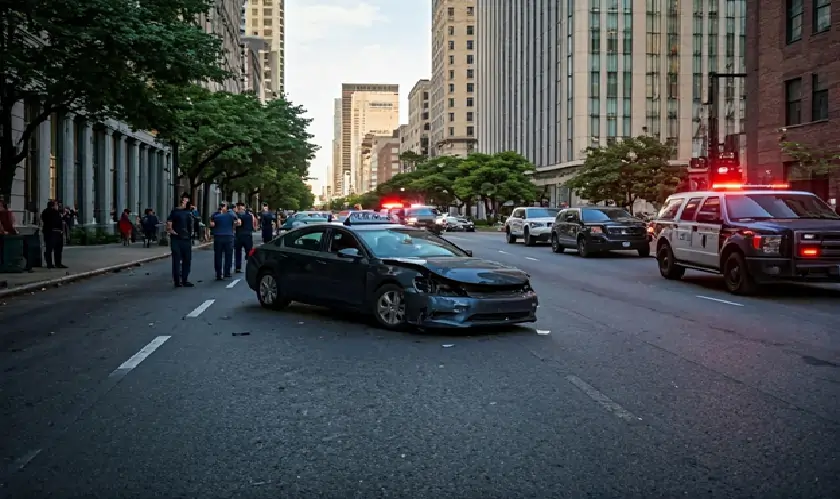Home Industry Law ethics and legal services Who’s Liable in a Lyft Accid...
Law Ethics And Legal Services

CIO Bulletin
15 September, 2025
You may be checking your texts or just staring out the window, while sitting back seat of a Lyft. Suddenly, there’s a loud bang, the car jerks, and your heart skips a beat. An accident. The first thought is always safety. The second is usually: who’s paying for all this?
That’s the tough part about rideshare accidents. You didn’t cause it, yet you’re caught in the middle of insurance companies, drivers, and a big tech company that’s quick to protect itself. Although a good Chicago Lyft accident lawyer can save you from all the mess. Let’s walk through how this really works.
Why rideshare accidents feel messy
A regular car accident is usually just two drivers and two insurance companies. Simple, or at least simpler. But with Lyft, you’ve got three moving parts:
the driver’s own insurance
Lyft’s company policy
the other driver, if one’s involved
Everyone wants to say “not it.” That’s why passengers often feel like they’re left out, even though they’re the ones most affected.And here’s something worth knowing. According to a University of Chicago study, traffic deaths rose by 2–3% after rideshare services like Lyft and Uber entered cities. More cars chasing rides, more hours on the road, it adds up.
So, if it feels like rideshare accidents are more common, you’re not wrong.
How Lyft’s insurance really works
Lyft does carry insurance, but it doesn’t cover everything, every time. It depends on what the driver was doing at the exact moment of the crash:
Driver offline: their own insurance applies. Lyft won’t step in.
Driver online, waiting for a ride: Lyft offers limited coverage, but not the full amount.
Driver matched with a passenger or driving them: Lyft’s $1 million policy is active. This is usually what covers passenger injuries.
Here’s the catch: insurance companies love to argue about details. Was the driver already on the app? Had they accepted the ride yet? That one second can decide which policy pays.
Who’s responsible?
For passengers, the big question is “who pays my bills?” Legally, a few parties can be held responsible:
The Lyft driver, if their driving caused the crash.
The other driver, if it was their fault.
Lyft itself, through its big insurance policy.
Sometimes it’s all three, and that turns into a battle between insurers. Meanwhile, the passenger is waiting for medical bills to be covered.
The passenger’s struggle
Here’s the unfair part. You weren’t driving, you weren’t deciding how fast to go or whether to check a phone. Yet you’re the one left with whiplash, hospital forms, and calls from adjusters.
Insurance companies sound polite, but their goal is to pay as little as possible. That’s why evidence matters; app records, phone data, driver histories, police reports. Lawyers often have to dig these up, because, without proof, insurers push passengers into accepting less than they deserve.
What to do right after a Lyft accident
The minutes after a crash are chaotic, but what you do then can make a huge difference later:
Check yourself first. Get medical help if you need it. Don’t push it off.
Take photos. Cars, street signs, the Lyft app screen—snap it all.
Swap details. Names, insurance info, licence plates, witnesses.
Report through the app. This creates a digital record.
See a doctor even if you feel fine. Some injuries don’t show up right away.
Call a lawyer early. Before talking too much with insurance companies.
These steps aren’t about making a fuss. They’re about protecting yourself from being brushed aside later.
Why these cases matterA Lyft accident isn’t “just another crash.” It’s part of a much bigger debate. Rideshare companies have changed how people move, how drivers are treated, and how the law thinks about responsibility.
Every passenger case adds to that story. Courts are deciding, piece by piece, how much power and responsibility a company like Lyft carries. That means your case isn’t only about one accident, it’s about shaping the rules of the road for everyone.
Closing thoughts
Being in a Lyft accident feels unfair. You didn’t cause it, yet you’re left with the fallout. The good news is the law gives passengers protections, and Lyft’s own insurance is often there for a reason.
If you’re a passenger in Chicago facing this, reaching out to an experienced Chicago Lyft accident lawyer can make the difference. The real challenge is cutting through the noise of insurers and legal fine print. But with the right help, you don’t have to face it alone.







